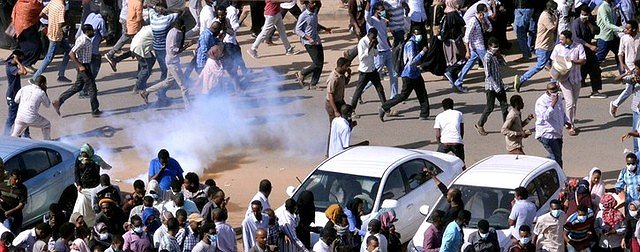Safia El Siddig is a Sudanese journalist and a member of the Marie Colvin Journalists’ Network. When she attended the ARIJ Annual Forum (Arab Reporters for Investigative Journalism) in Jordan in 2018, the first thing that drew her attention was the session on field safety. Having been assaulted during a field mission, Safia wanted to know if she could have avoided what happened back then, and how to avoid it in the future.
When I was a trainee journalist, I was very reckless. My eagerness drove me to take risks without precautions. My only concern was to get the needed information for my report and verify it.
I was attacked by five men including the one I had interviewed. They kept beating me and running after me until I was arrested.
I will never forget what happened to me in 2010. I was commissioned by my newspaper to cover protests in the south of Khartoum, where I didn’t know anyone. I was very excited about the topic and driven by the suffering of the people there. I wanted to hear their firsthand accounts despite the risk of police persecution. While I was conducting an interview, a citizen lured me to a small house further away from the protests, claiming that he was worried for my safety. He said I would meet more people in the house, who were waiting to tell me their stories.
At the house, I interviewed three women and one man who was wearing civilian clothes. But when I wanted to leave, I sensed that something was wrong, so the first thing I did was secure my data because it was the most important thing I had. Suddenly, I was attacked by five men including the one I had interviewed. They kept beating me and running after me until I was arrested. Then they put me in a vehicle and insisted that I hand over the information I have. I had to convince them that I threw away my papers, so they got me out of the vehicle and kept beating and chasing me for a long time.
This was the first incident, but not the last. We face immense dangers as female journalists, but many of us don’t pay attention to safety concerns because we seem to think that the risks of being a journalist are just a reality that we must live with. But during the ARIJ conference, I was given an individual consultation and this was the first time I received professional advice on field safety:
Preparation
many of us don’t pay attention to safety concerns because we seem to think that the risks of being a journalist are just a reality that we must live with
We should prepare for our task by learning about the circumstances under which we will work - not just psychologically but medically as well. It would be good to write down a checklist of what you need:
-
Are you going to need some medication where you’re going? Should you carry the medicine or just a prescription? Do you have the physical and psychological stamina to work in that area?
-
It is advisable to carry a backpack because it does not impede your movement and may protect your back in case of an attack.
-
Remember to take water and some food that contains enough nutrition.
During the preparation, there are things you must bear in mind regarding the assignment itself:
-
Know in advance the exact nature of the assignment, and only work on that.
-
Do some background checks on your sources. Do you believe they will support you, or are you worried they could put you in danger? Do not trust anyone blindly.
-
Expect the worst always and plan accordingly.
-
Conduct a thorough research on the area you are going to (weather, customs, social and economic and political structure, supporters and opponents of your assignment, how they treat women there, travel routes, safe entrances and exits in case of danger).
-
Set up a transportation plan. Will you use private or public transport? What are the risks and advantages of either option?
The mission
Sometimes it’s good to wear a ring that indicates you are married, because in some societies married women are viewed differently from single women
Having conducted your research about the area, you need to decide on the right location to do your interviews.
-
In some cases, it might be better to write down your interviews instead of recording or filming them, especially if you’re trying to avoid drawing attention and endangering yourself or your interviewees.
-
After you’re done with your interviews, it might be best to file them online immediately (if you are in an area with good Internet coverage), or keep copies with a trusted source.
-
Wear clothes that protect you from weather and security conditions, and take into consideration the social context in which you operate. The source of danger may not only be the official authorities, but also ordinary citizens.
-
Sometimes it’s good to wear a ring that indicates you are married, because in some societies married women are viewed differently from single women, so a ring might grant you some protection.
-
Do not walk alone, try your best to be accompanied by someone you trust.
-
Be steadfast and do not lose your temper when provoked.
Exit strategy
Working in high-risk areas requires prior knowledge of all entrances and exits, and drawing up a plan for safe transportation. This must be prepared before you start the mission. Many journalists have lost their lives because, despite all the precautions they have taken, they have not set up an exit plan from dangerous areas. Always remember that we can not control any risk or threat but we can avoid or limit it.
Photo: protests in Khartoum in December 2018. By Mohamed Nureldin Abdallah/Reuters
